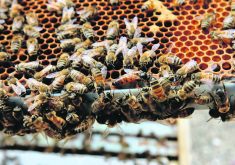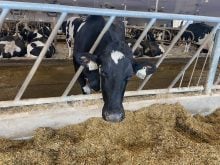It may be better to knock disease down, instead of out.
That’s the heart of a new strategy to treat bacterial diseases in humans and animals, curbing their virulence rather than using antibiotics to wipe out the bacteria that causes them, and possibly contributing to the mushrooming challenge of antimicrobial resistance, or AMR.
The goal of the strategy is to prevent bacteria from developing resistance to medicines, says Natalie Strynadka, a biochemistry professor at the University of British Columbia. She is part of a team of researchers working on AMR under the auspices of the Canadian Institutes of Health Research.
Read Also

MANITOBA AG DAYS: Unmoved China tariffs worrying for Manitoba pork
Manitoba pork producers and Agriculture Minister Ron Kostyshyn have both noted lack of progress on Chinese tariffs on pork.
“Bacteria are very clever when they encounter something attempting to stop them,” she said.
With enough exposure to medicines, it’s inevitable bacteria will develop AMR. That’s why researchers are looking at ways to prevent their overuse.
“It’s fair to say the best strategy is to reduce any use of antimicrobials in humans or animals,” she said. “The less you use, the better off we’ll be in the long term.”
Treatments would enable the human or animal to become healthy enough to recover from the disease. The use of antimicrobials in aquaculture also needs to be closely scrutinized.
Her comments came as health and livestock groups wait for an announcement from Health Minister Jane Philpott on how her department will implement proposals for reforming the use of antibiotics in livestock production.
In October, she told the Canadian Meat Council she wants to act on the plan this fall. Without change, deaths linked to diseases that become resistant to modern medicines could outstrip those caused by cancer by 2050, Philpott told the recent annual meeting of the Canadian Meat Council.
In mid-November, she announced that Canada is investing a $9-million investment in a World Health Organization project to develop a comprehensive global approach to combating AMR. The funds will support the WHO — working with the UN Food and Agriculture Organization and the World Organization of Animal Health — in developing a global package of initiatives that will address the human, animal, agricultural and environmental aspects of the fight against AMR.
Overuse of important antimicrobials in humans and animals has been blamed for the growth in AMR. Strynadka says both aspects of the problem are important and need to be addressed.
“We need to look at how much of the medicines end up in our water.”
Researchers are looking for weak spots in bacteria that have developed AMR that might be able to be exploited by tweaking medicines, she added.
“We have a gap of 20 years when no medicines were developed by the pharmaceutical industry because everyone thought we had all we needed,” she said.
She also said there needs to be more collaboration among government, drug makers, the medical community, veterinarians and farmers on combating AMR. “We need to find where a better effort would be most productive.”
While the livestock industry in Canada has worked to reduce its use of class one and two medicines, the most important to humans, no farmer wants to let his or her animals or poultry suffer needlessly when treatment is available, she noted. “We have to acknowledge that it’s more expensive to raise livestock without using antimicrobials.”
Most agri-food groups expect Health Canada will implement previously announced proposals from animal health and livestock groups. They include ending own-use imports by farmers of livestock drugs from the United States, requiring veterinary supervision of all prescription medicines used on farms and ending growth promotional claims.
Public Health Agency says AMR is one of the most serious public health threats to the treatment of infectious diseases worldwide. If action is not taken now, annual worldwide human deaths due to antimicrobial resistance could reach an estimated 10 million by 2050, overtaking deaths due to diabetes and cancer combined.

















